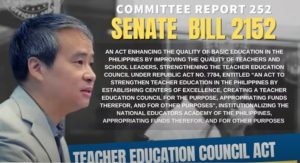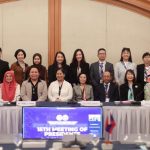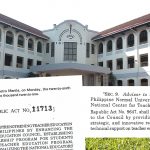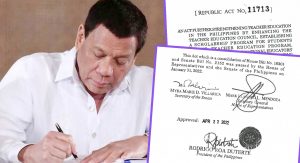Sen. Villanueva: It is a grave necessity to strengthen the Teacher Education Council
 Sen. Joel Villanueva—chair of the Senate Committee on Higher, and Technical and Vocational Education—delivered his co-sponsorship speech on 17 May 2021 for Senate Bill No. 2152, a bill that seeks to reform the Teacher Education Council (TEC).
Sen. Joel Villanueva—chair of the Senate Committee on Higher, and Technical and Vocational Education—delivered his co-sponsorship speech on 17 May 2021 for Senate Bill No. 2152, a bill that seeks to reform the Teacher Education Council (TEC).
Sen. Villanueva anchored his 13-minute speech at the Senate plenary session on how education policies and institutions determine the quality of teachers, and how the COVID-19 pandemic underscores the need for teacher education reforms.
“The educational needs arising from the COVID-19 pandemic shed more light on our dismal pre-pandemic educational situation and give form and shape to the bill we are proposing. It is a grave necessity to strengthen the Teacher Education Council,” the senator said.
While the three education agencies crafted their respective strategies for learning continuity in response to the pandemic, Sen. Villanueva said “the use of different terminologies for learning methodologies and the differences in the approaches taken by the Department of Education (DepEd), Commission on Higher Education (CHED), and the Technical Education And Skills Development Authority (TESDA) resulted in confusion among millions of learners in the country, as well as to their parents and teachers.”
Senate Bill No. 2152 is the substitution bill for Senate Bill No. 1887 filed by Sen. Sherwin Gatchalian and co-sponsored by Sen. Villanueva and Senate Bill No. 1893 filed by Sen. Ramon Revilla Jr. It proposes to amend RA 7784 or the Teacher Education Council (TEC) Act to carry out its original mandate of strengthening teacher education. Since last year, the Senate’s joint education committees has held two public hearings and six technical working group (TWG) sessions to tackle the three TEC reform bills where the Philippine Normal University and RCTQ were among the resource organizations.
Sen. Villanueva enumerated three (3) reasons why Senate Bill No. 2152 “can make all the difference in attaining better post-Corona schools and in improving teachers’ and school leaders’ effectiveness”—i) strengthening the TEC will help synchronize standards in teacher education and development; ii) strengthening the TEC can help improve learning outcomes; and iii) strengthening the TEC will improve the notoriously low passing rates in the Licensure Examinations for Teachers (LET).

Sen. Villanueva shows a diagram that illustrates the continuum of teacher education and development.
He showed a diagram of the professional journey of a Filipino teacher consisting of at least three major phases: pre-service training, Licensure Examination for Teachers or LET, and in-service training.
“Common sense dictates that these three stages should follow a coherent standard, but they do not. There are misalignments in teacher pre-service training and what our schools and students need,” the former TESDA Director General said.
He added: “A study of the Research Center for Teacher Quality, a joint undertaking of the Philippine Normal University and the University of New England, Australia, shows that the teacher education curriculum fully covers only 10 out of the 37 competencies expected of teachers. Re-training of teachers, which is a very costly undertaking for the DepEd and the government, is necessary.”
Under the Senate Bill No. 2152, he said, the new TEC will serve as “a venue, mechanism, and keeper of synchrony and standards for teacher education and development. The CHED, the PRC, the DepEd, and the TESDA will have to agree on coherent professional standards for teachers.” The strengthened council, he said, will ensure that the colleges of education will produce teachers, duly screened and accredited by the PRC.
The new bill, Sen. Villanueva added, will also expand the membership of TEC to include school leader representatives, strengthen the link between pre-service and in-service education programs, and institutionalize the National Educators Academy of the Philippines (NEAP) for the in-service training of teachers, among others.
“Mr. President, Senate Bill No. 2152 will empower the TEC to mandate minimum requirements for teacher education programs, monitor, and assure quality compliance through the CHED. The bill will ensure an efficient, seamless, and transparent link between outcomes of teacher education programs and the professional standards for teachers,” he added.
The proposed bill also seeks to empower the TEC to co-design the LET with the Professional Regulation Commission (PRC), thereby ensuring “transparency in the conduct of the LET through the release of the most recent LET questions immediately after their administration by the PRC to the Teacher Education Council and the public.”
A year after the pandemic started, the senator said “no other sector sits closer to ground zero of the COVID-19 pandemic than education. ”
“Our schools can be better than pre-COVID schools. We can not afford to go back to our 2019 performance levels. But how can we develop better schools amidst all the chaos and uncertainties? Studies emphasize one important recommendation, that is, improving the effectiveness of teachers and school leaders, which is the foundation of our proposal to strengthen the Teacher Education Council,” he said at the plenary.
Since 2017, RCTQ has worked with the Technical Working Group for Teacher Quality (TWG-TQ), led by the Cabinet Secretary Karlo Nograles under the Office of the President, in drafting recommendations to address teacher quality.
Watch Sen. Villanueva’s co-sponsorship speech below:
https://www.rctq.ph/?p=2660NewsTeacher Education Council






